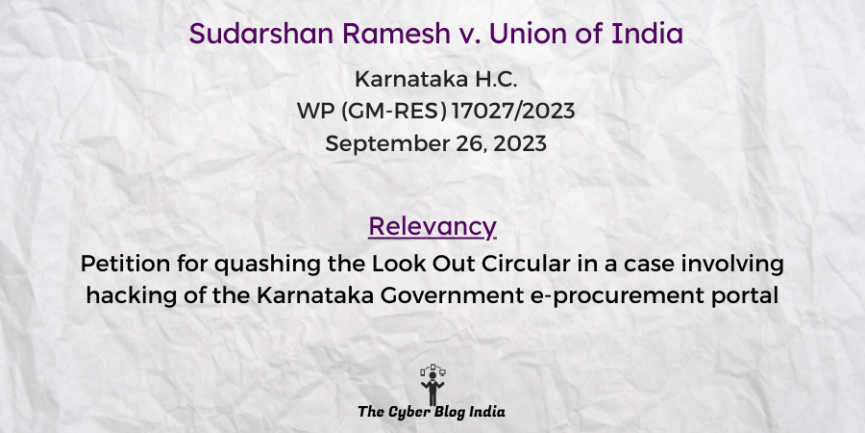Sudarshan Ramesh v. Union of India

Sudarshan Ramesh v. Union of India
In the High Court of Karnataka
WP (GM-RES) 17027/2023
Before Justice Hemant Chandandgoudar
Decided on September 26, 2023
Relevancy of the case: Petition for quashing the Look Out Circular in a case involving hacking of the Karnataka Government e-procurement portal
Statutes and Provisions Involved
- The Indian Penal Code, 1860 (Section 120B, 201, 204, 384, 419, 420, 34, 35, 37, 471)
- The Information Technology Act, 2000 (Section 43, 66)
- The Prevention of Money Laundering Act, 2002 (Section 50)
Relevant Facts of the Case
- CID registered an FIR against 19 accused, alleging they had hacked the e-procurement portal of the Government of Karnataka. The petitioner’s brother was one of the 19 accused. When the petitioner was to board his flight to the Netherlands, the authorities restrained the petitioner concerning the Look Out Circular (LOC) against him.
- The petitioner has appeared before the court every time the court issued a summons for his appearance to record his statements.
Prominent Arguments by the Advocates
- The petitioner’s counsel argued that in the absence of cognisable offence registered against the petitioner and of reasonable grounds. The court cannot repeatedly summon the petitioner and expect to give self-incriminating statements. Thus, the High Court should revoke the Look Out Circular.
- The respondent’s counsel argued that there are reasonable grounds for summoning the petitioner to record his statements for investigation offences under PMLA against his brother. The counsel also claimed that the petitioner is not cooperating about the transaction that has taken place between his father and a third party of which the petitioner had knowledge.
Opinion of the Bench
- No cognisable offence is registered against the petitioner, nor is a non-bailable warrant issued against the petitioner. The competent authority cannot issue an LOC solely because the petitioner has not provided information to the authorities’ convenience.
- The respondent has not placed any material to substantiate the suspicion or reasonable ground to summon the petitioner except that he is the brother of the accused.
Final Decision
- The bench allowed the writ petition and declared the LOC to be unenforceable.
Aditi Mangesh Sawant, an undergraduate student at NMIMS Kirit P Mehta School of Law, Mumbai, prepared this case summary during her internship with The Cyber Blog India in January/February 2024.
